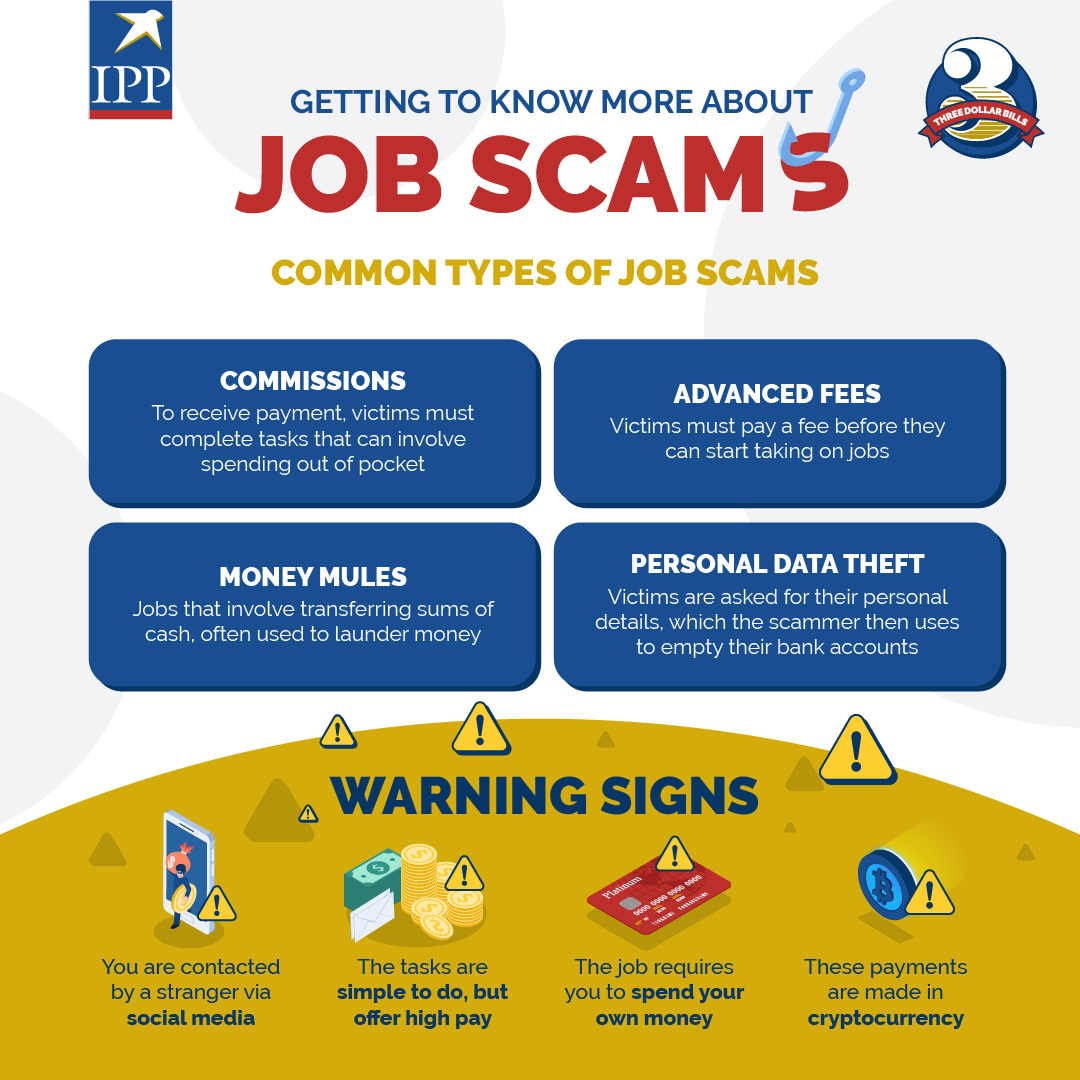
4 Common Job Scams and How to Avoid Them
Job scams have risen to become one of the most popular scam types in recent years, and unsurprisingly so. After all, who doesn’t want money? Not only that, they often take advantage of our desire to seek out not just good deals, but great deals. And as the awareness of “too good to be true” scams grows, scammers are getting better at being subtle, and therefore, more convincing.
If you’ve never seen a scam before, it can be hard to know what to look for. Familiarising yourself with the various ways job scams manifest can help you avoid falling into their trap. Some common job scam types are:
- Commissions-based job scams
- Advanced fee job scams
- Money mule scams
- Personal data scams
Commissions
Victims are promised a commission in exchange from completing various tasks. This ranges from buying products from e-commerce websites (which would later be refunded), to liking social media posts or reviewing businesses. The tasks start off with either no money or small amounts of money involved, and the scammer will refund any money spent, as well as include the commission for completing the tasks. As the victim continues to complete tasks, the amount of money they are required to transfer out grows larger and larger, with the scammers using products such as laptops or luxury goods with high price tags as reason for the large amounts of cash needed. Eventually, the scammer would stop issuing refunds, leaving victims with large losses.
Advanced Fees
Here, victims are told that they will be paid after completing certain tasks that usually involve money. For instance, paying a registration fee or membership fee to join. Other versions involve creating accounts on a specified app or platform, and then topping up funds into this account. In this variation, victims are not refunded initial amounts to build trust, but are instead told to complete the assigned tasks before they can receive their commission. These platforms are often advertised as “job platforms” that offer lucrative job opportunities, to justify the registration or membership fees.
Money Mules
These are jobs that involve transferring sums of money from one account to another, either through bank transfers or other third-party services. These are often used by criminals to launder illegal proceeds.
Personal Data Theft
These jobs ask for personal details including your name, NRIC number, bank account details or OTPs. Scammers can then use this information to make purchases or withdraw money using your account.
Common Warning Signs
Over the years, scammers have figured out how to sound convincing enough to not raise your alarm. More and more, advice such as “look out for grammar errors” or “check the URL domain” may not be enough to help spot a scam. On top of the usual advice, here are some key warning signs you can look out for.
- You receive a job offer from a stranger out of the blue, via Whatsapp or other social media apps.
- The job offers high pay and requires very little time or effort, and can be performed from home.
- You are told to create an account on their job platform, then to top up the account with your own cash.
- You are told to make payments by transferring money to an unknown bank account or using cryptocurrency.
Of the above, the method of payment may be the biggest telltale sign that something is not right. These methods of “payment” are highly preferred by scammers as once completed, it can be difficult, if not impossible, to trace and recover the money. If you suspect that you’ve come across a scam, check the mode of payment. Bank transfers, mentions of cryptocurrency, or purchases of gift cards in lieu of payment are common red flags.
The mode of payment isn’t the only thing to look out for. Scammers may deploy a range of tactics to appear more legitimate, including spoofing the websites of well-known brands or creating fake apps that look authentic. In other cases, you may be added to a group chat with other “job recruits”, a tactic scammers use to appear more legitimate and generate hype, which is especially useful with “jobs” that involve making repeated purchases.
Conclusion
Sifting through job opportunities to separate the fraudulent from the genuine can be tiring. As a quick rule of thumb — if you’re being told to spend money in order to make money, turn the other way.

“This advertisement has not been reviewed by the Monetary Authority of Singapore”
Disclaimer: Investments have investment risk. Past performance is not necessarily indicative of the future performance of an investment. Please seek advice from a Financial Adviser Representative before making any investment decisions.
IPP Financial Advisers Pte Ltd
78 Shenton Way #30-01 Singapore 079120 | Tel: +65 6511 8888 | enquiry@ippfa.com |
IPP Financial Advisers Pte Ltd
78 Shenton Way #30-01 Singapore 079120
Tel: +65 6511 8888 | enquiry@ippfa.com
